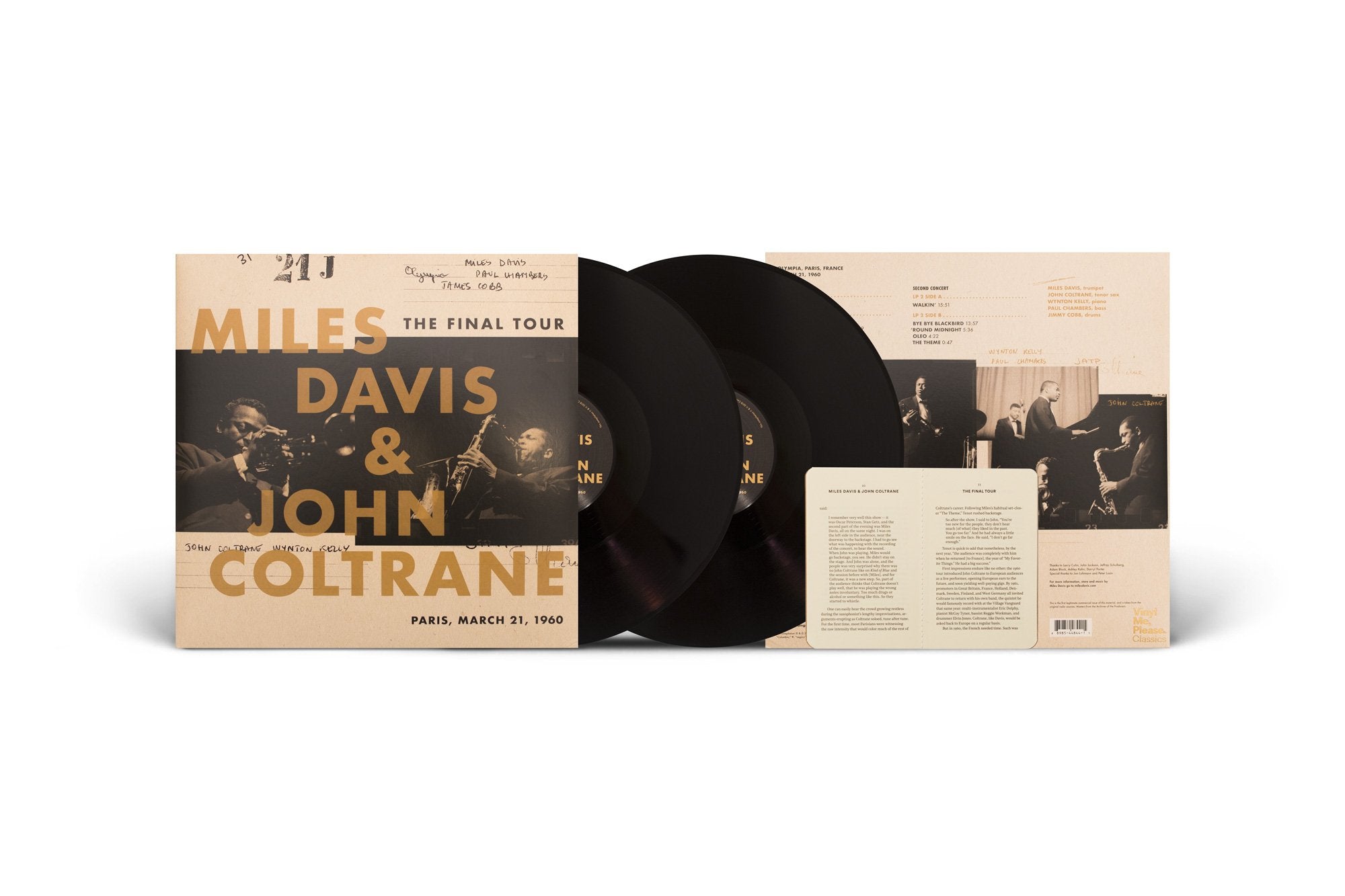Miles Davis & John Coltrane’s The Final Tour: Paris, March 21, 1960 is March’s VMP Classics Album
Sign Up For Vinyl Me, Please Classics Now To Receive It In February
In March, members of our Classics subscription will receive Miles Davis & John Coltrane’s The Final Tour: Paris, March 21, 1960, a live recording of a Miles Davis tour date in Paris at L’Olympia. Recorded for radio, and remastered from the master tapes, this release has never been on vinyl until now, and you can only get it from Vinyl Me, Please Classics. Read below for a video explaining the album, pics, and an excerpt from the Listening Notes booklet by Ashley Kahn.
The performances on this album, The Final Tour: Paris, March 21, 1960 — released here officially on vinyl for the first time—are as renowned for their emotional intensity as they are for their musical fervor. The common judgement is that this concert found a great jazz ensemble—the Miles Davis Quintet of 1960—audibly straining to hold itself together stylistically, its members moving in divergent directions, their music unable to hide an inner turmoil between the musicians—to the point that the audience responded to it, clearly and audibly.
Miles himself looked upon the whole tour, starting with their Paris concert, in a similar manner: “Norman Granz had booked me and my band on a European tour,” Miles wrote in 1989. “[Coltrane] decided to go with us, but he grumbled and complained and sat by himself the whole time we were over there. He gave me notice he would be leaving the group when we got home.”
An equally convincing interpretation of these performances from 1960 is that Miles and his quintet were redefining what a great band could sound like, and how much music it could contain—at one time, in one concert, even in one tune. It’s not that the band members were so much apart, but rather that each were more themselves within the same unit—that divergence could co-exist and be distinct together. It’s this idea that grew from Miles’s 1950s groups and that later became his primary directive to all future sidemen through the ‘60s and ‘70s, up to his passing in 1991: Figure out what to do with the freedom in the music. Bring your identity and your own ideas to the mix. Surprise me!
Surprise indeed; there was that, in abundance on March 21, 1960. The venue was L’Olympia theater, 9th arrondissement, Paris; capacity, 2000, and the show was sold out. It was the opening night of a Western European tour featuring three top headliners—Miles, Oscar Peterson and Stan Getz. As overseas jazz tours went back then, it was longer than most, running for three weeks from March 21 through April 10. The official title was “Norman Granz' JATP Presents Jazz Winners 1960”: a Jazz At The Philharmonic project produced by jazz impresario Norman Granz in partnership with different promoters in each country, starting in France, then on to Sweden, Denmark, West Germany, Switzerland, Austria, and Holland. Most shows sold to capacity and reviews were uniformly positive, focusing often on Miles. In late April, Billboard magazine reported from Copenhagen on how the JATP performance on March 24 was the first show “to draw full houses” in 1960, and that “the critics were laudatory, but carped about ‘too many stars’—they wanted more of Miles Davis.”

You can sign up for Classics here.
But wait, there’s more: later this year, we’ll be opening Classics to the general public as a standalone subscription separate from Vinyl Me, Please. If you’re interested in Classics as a standalone, and want to be notified when spots become available, click the button below.
Notify me when Classics becomes available to the public
The tour held a few firsts for Miles. It was a career breakthrough for him in Europe, upgrading from the jazz club circuit in the U.S. to the level of international music star, playing major theaters in the capitals of the Western Europe, appearing in tailored tuxedos, accompanied by his new, stunning wife Frances, greeting old and new friends backstage.
The tour also marked Miles’s first time performing overseas with his own ensemble—a significant point of arrival for any touring musician. In early 1960, Miles was leading a quintet that featured most of the lineup from his recent recording Kind of Blue: pianist Wynton Kelly, bassist Paul Chambers, drummer Jimmy Cobb, and tenor saxophonist John Coltrane. (Intriguingly, the tour program listed one other band member, vibraphonist Buddy Montgomery—brother to guitarist Wes and bassist Monk. In fact, he had played with the quintet on a West Coast run in February and early March, and was booked to be part of Miles’s touring group—but he never made it. Apparently, an intense fear of flying caused him to cancel at the last minute.)
Upon his return home in April 1960, Coltrane got back to leading his own band and pursuing his own musical paths. Save for a guest appearance the following year on Miles’ Someday My Prince Will Come album, he never looked back.
You can read the rest of the Listening Notes, and hear the album, by signing up for Classics.
Top photo by Jean-Pierre Leilor
Related Articles
Join the Club!
Join Now, Starting at $44Exclusive 15% Off for Teachers, Students, Military members, Healthcare professionals & First Responders - Get Verified!




